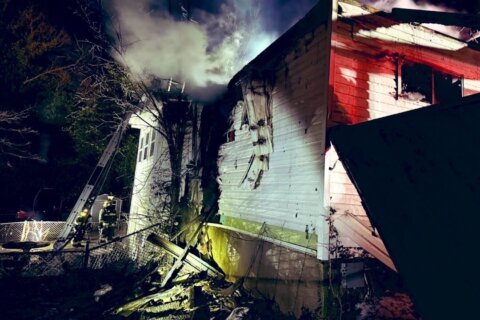It could be early 2022 before the embattled D.C. crime lab regains its full accreditation to perform forensic testing, the lab’s interim director told a panel of science advisers last week.
The process of regaining the authority to analyze all crime scene evidence from across the city “will take a matter of months at a minimum,” said Anthony Crispino, interim director of the D.C. Department of Forensic Sciences. “I think realistically we’re probably talking somewhere in the neighborhood of six months.”
Speaking Friday at a meeting of the agency’s Science Advisory Board in his first public comments since taking the helm of the agency, Crispino said the lab has abandoned a contentious appeal challenging the withdrawal of its accreditation that was filed under his predecessor.
Instead, the plan is to work with the forensic consulting firm SNA International to bring some units back online sooner “as we deal with the deeper-seated issues that might exist” in the lab’s Firearms Examination Unit and Latent Fingerprint Unit.
Crispino described SNA International, based in Alexandria, Virginia, as a “well-renowned firm that does, in essence, lab rescue work.” He said the company has convened a panel of experts, including “four or five former lab directors from across the country,” with decades of experience across forensic science disciplines, to help get the lab re-accredited and probe past problems.
SNA reviewed about 6,000 documents in a “desk audit” over the past month, Crispino said, and hasn’t identified any problems in the lab units that handle DNA, digital evidence and forensic chemistry, indicating those units could regain accreditation more quickly.
“SNA is going to expedite a project with those three units,” Crispino said. “And I’m confident that, barring any unforeseen circumstances, getting to the point of applying for re-accreditation should be much shorter” than the time frame for the other two units.
The lab was inspected by the ANSI National Accreditation Board last summer, and re-accredited through 2022. But the accreditation was stripped in April of this year, following a report from another team of auditors retained by the U.S. Attorney’s Office for D.C. and the D.C. Attorney General’s Office that alleged lab managers concealed conflicting findings in the firearms unit after mistakes were uncovered in a murder case.
D.C. officials initially described the loss of accreditation as only a 30-day suspension, but the accrediting board ultimately revoked the lab’s accreditation entirely — a nearly unprecedented move.
After the former agency director, Dr. Jenifer Smith, resigned in May, amid pressure from the D.C. attorney general and a D.C. Council member, Mayor Muriel Bowser announced she was bringing in SNA to review the lab with an aim of getting it re-accredited.
At the meeting Friday, Crispino promised that at the same time SNA is helping fast-track re-accreditation for some units, the company would dig deep as it probed what went wrong.
“I’ve asked them to look broad spectrum at the agency, from the top to the bottom, under each of our divisions, to include upper-level management, HR practices and, then, into each of the divisions and the specific units,” Crispino said.
He added, “I’ve asked them to leave no stone unturned.”
As WTOP reported, the company, which previously did consulting work for the lab, has also been awarded a separate contract for nearly $2 million for a major upgrade of the agency’s Laboratory Information Management System, prompting questions about a potential conflict of interest. The matter did not come up at the board meeting Friday.
‘It was a people problem’
The interim director said that, based on what he’s seen in his short time at the agency, he believes the problems at the lab can mostly be chalked up to poor management.
“As an outsider coming in, my take on what I have seen on the ground: I am of the position that this is not a science problem at DFS. It was a people problem,” he told board members. “Based on what I’ve seen and the conversations that I’ve had thus far in my extremely short tenure, management did need to change. There were changes in people that had to occur to address the issues that preceded my arrival at the agency.”
Crispino said SNA, as part of its broad review of the lab, will soon start interviews with lab managers and employees, as well as with the science advisers, the U.S. Attorney’s Office and the Public Defender Service.
Crispino said neither he nor any members of his management team would be involved in the interviews. “I want this to be as fair and as independent as possible,” he said.
An anonymous 10-question survey will also be sent to all staff, he said.
After the round of interviews, SNA will develop an initial report for Crispino to review and begin work on what he called a “corrective action plan,” which is expected by the end of the year.
He said Dr. Amanda Sozer, SNA’s chief science officer, is leading the project, and called the audit project “the opportunity to right the ship and get us back on track towards accreditation.”
When he was asked by a board member whether SNA’s report and recommendations would be made publicly available, Crispino responded: “I mean, nothing’s hidden. All this has played out in the public view. To the extent possible, yes, I would like it to be a public-facing document.”
He added, “I think the public needs to see that we’ve taken meaningful steps to get us back to where we need to be.”
Old cases
Henry Swofford, former chief of the latent print branch at the U.S. Army Criminal Investigation Laboratory, who is a recent addition to the lab’s board of science advisers, also quizzed Crispino about whether the crime lab has a plan for working with prosecutors and defense attorneys to identify past cases and convictions that should be scrutinized in light of the past issues at the lab.
Crispino said the lab was “committed to helping to the extent feasible,” but suggested he would be relying on attorneys, themselves, to identify any potentially problematic cases.
“This is people’s civil liberties at stake and I take that to heart. … I have a very unique understanding that the action that we take here, the work that we do here can have a very significant impact on somebody’s life, and I don’t take that lightly,” said Crispino, a former D.C police officer and prosecutor in the attorney general’s office.
But he pointed to need for the District’s own crime lab and the expected full reopening of D.C. Superior Court in September. “My focus has to be, first and foremost, on regaining accreditation,” he said.








